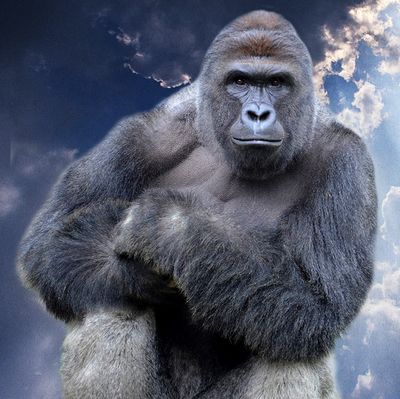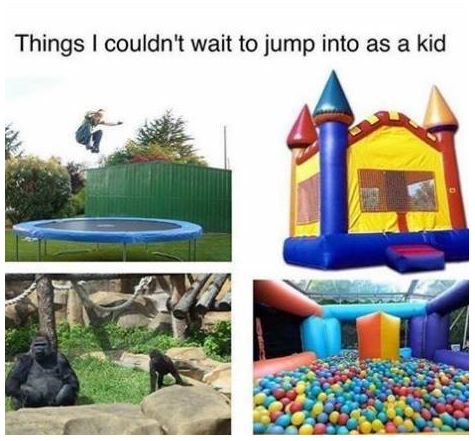
What is so funny about dead animals? The answer is: Nothing. And yet Harambe, the gorilla who was shot and killed in May by security personnel at the Cincinnati Zoo after a 3-year-old boy climbed into his enclosure, has become in his death an all-purpose punch line across Twitter, Tumblr, and Facebook — a meme to be reckoned with.
We should not still be talking about Harambe. When I say “should not,” I don’t even mean that it’s morally wrong to joke about Harambe. (Though more on that in a moment.) I mean that, as a running joke, Harambe should have had a shelf life of maybe two weeks. The meme should have died shortly after the animal did.
But it didn’t. Last week at the Republican National Convention, Harambe (the meme) was spotted in the wild:
Memes about Harambe started popping up almost immediately after news of his death hit the web, at almost the same moment as the outrage over the tragic death of the gorilla. This is unsurprising: Memes will flower in the cracks of whatever is circulating on a given social network, and mass outrage, which seizes social media for hours at a time, necessarily provides a fertile ground. What’s surprising is that the outrage over Harambe has subsided, but the memes live on.

Are Harambe memes offensive? I’m not here to judge Harambe memesters, nor to absolve them. I am merely an observer. But it seems worth saying that the running joke of Harambe-the-punch-line isn’t really predicated on its shock value. Harambe memes aren’t the topical equivalent of dead-baby jokes; they’re fairly standard internet non-sequitur nonsense humor.
Still, uh, what gives? Marx tells us: “History repeats itself, the first time as tragedy, the second time as farce.” And Harambe is not the first famous animal to die senselessly in the age of social media.
Cecil the Lion, as anyone who was online last year will remember, was the African lion lured out of his sanctuary and killed by the dentist Walter Palmer. The killing was a flash point for a weeks-long cycle of anger, outrage, and invective, much of it justified (Palmer had paid $50,000 for the opportunity to travel halfway around the world to kill a wild animal) and some of it, maybe, a little bit, disingenuous (the BBC reported that local Zimbabweans didn’t really care about the incident). It dominated the social web for a month, and then, more or less, disappeared.
Even if the story didn’t continue much past the inciting incident, it nevertheless created a framework for How We Talk About Senseless Big-Animal Death Online. When Harambe was killed, there was already an understanding of what would happen next, and how the story would play out over the next several weeks. And so Harambe’s ironic meme brigade tore out of the starting blocks like a rocket. Cecil memes happened as a response to Cecil outrage, but Harambe memes happened in anticipation of Harambe outrage. Harambe became a referendum on and a satire of social-media-outrage culture, his name a stand-in for everything wrong with the way social media reacts to news.
And, of course, once Harambe became a joke, his name was launched into the nonsense stratosphere in which all big memes orbit — the place where the word Harambe itself suffices for a punch line, without needing to mean much at all. Which has led us now to the current pervasive Harambe meme: dicks out for Harambe. Here is how (I think) it works: As a tribute to the primate, you get your dick out. Here is the actor Danny Trejo doing it. I’m not sure what that accomplishes, but…
So what happens next? It seems worth saying here, below Danny Trejo, that maybe the biggest reason “Harambe” has managed to survive this long is that it still carries the frisson of offensiveness, even if it’s hard to actually take offense at the jokes. In other words, it’s a meme that will never be co-opted by internet-literate corporate Twitter accounts or deployed by some hapless news anchor hoping for a viral moment. The internet feels less and less like a truly separate cultural space, and fewer and fewer such internet-only in-jokes exist (tongue-in-cheek 9/11 trutherism, beloved by teens, comes to mind). It’s hard to come across cultural products online untainted by corporate advertisers or sponsors. “Harambe” is still a funny punch line because brands will never touch it.
Obviously, there are other ways to end the Harambe meme. Like writing a think piece about it.





























